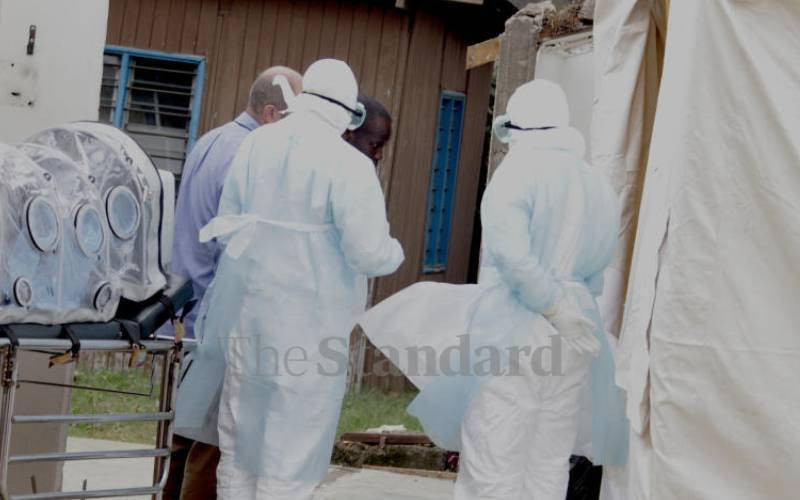
The Ministry of Health has placed 20 counties on high alert for Ebola virus infection as cases in neighbouring Uganda rise.
Dr Patrick Amoth, the Acting Health Director General, said on Tuesday last week that the counties of Busia, Nakuru, Kiambu, Nairobi, Kajiado, Machakos, Makueni, Taita Taveta, Mombasa, Kwale, and Kericho were at risk of infection with the virus that broke out in Uganda on September 19.
Also placed on high alert were Bungoma, Siaya, Migori, Homa Bay, Kisumu, Trans Nzoia, West Pokot, Turkana, and Uasin Gishu counties.
Dr Amoth said Ebola was likely to spread in Kenya due to the massive human traffic between Kenya and Uganda through the Busia and Malaba crossing points.
He singled out the Jomo Kenyatta International Airport, Kisumu, Eldoret and Mombasa international airports, as well as the heavy population of Ugandan citizens in Nairobi, Kajiado and Kakuma as possible risk factors.
Dr Amoth said the country was "stepping up surveillance for detection and preparedness for appropriate response".
But local scientists reckon Kenya might escape Ebola outbreak as there is no breeding environment compared to Uganda.
- Finding purpose and fortune in the soil
Keep Reading
Kenyan scientists have also noted that bats are spreading the virus in Uganda, which neighbours the Democratic Republic of Congo (DRC), an epicentre of the contagious viral disease spread through body fluids such as blood.
Its symptoms include severe bleeding, persistent headache, muscle pain, chills and fever.
Ebola is a severe, often fatal illness, affecting humans and other primates.
Prof Matilu Mwau, an infectious disease specialist, told Health & Science that Uganda and DRC had not vaccinated people who come into contact with bats.
He said Ebola has a natural reservoir in animals, and there is no capacity to kill all the animals, yet people residing in their habitat are not vaccinated.
"Probably there are bats spreading Ebola and making us sick," said Prof Mwau, advising Kenyans heading to Uganda to be careful how they interact with others at the border points.
"People should not confuse Ebola with Covid-19, but rather be careful with whom they come into contact. Those who have come into contact with someone with Ebola should not freely mingle with others. They should stay at the same place," said Prof Mwau.
Another expert, Prof Julius Oyugi, Director of Research at University of Nairobi's Institute of Tropical and Infectious Diseases, said the spread of Ebola depends on whether humans have encroached the habitat of bats which are "non-human primates".
"People in Central Africa eat bush meat. Interacting with non-humans contributes to transmission. Uganda is closer to DRC where the Ebola virus is prevalent," he said.
 The Standard Group Plc is a multi-media organization with investments in media platforms spanning newspaper print
operations, television, radio broadcasting, digital and online services. The Standard Group is recognized as a
leading multi-media house in Kenya with a key influence in matters of national and international interest.
The Standard Group Plc is a multi-media organization with investments in media platforms spanning newspaper print
operations, television, radio broadcasting, digital and online services. The Standard Group is recognized as a
leading multi-media house in Kenya with a key influence in matters of national and international interest.


